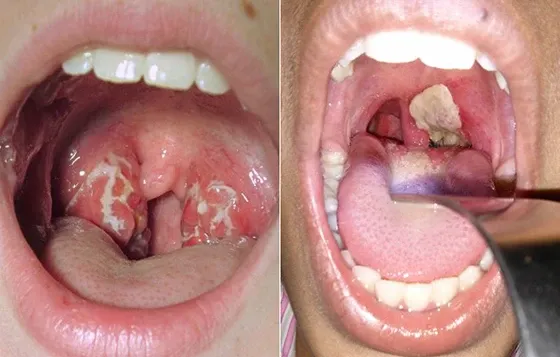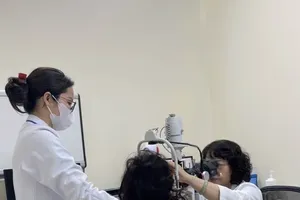
Discussing the complexity of diphtheria in Vietnam lately, Director Hoang Minh Duc first explained that this disease is usually transmitted through the respiratory tract or through direct contact with secretions from the nose and throat of infected individuals or carriers when they cough or sneeze.
The Prime Minister issued Directive No. 68/CD-TTg on July 13, 2024, instructing provincial and municipal people's committees to strengthen surveillance, early detection, and thorough control of outbreaks to prevent community transmission. The Ministry of Health has also urged these authorities to implement outbreak management and proactive disease prevention measures for the population as per the Ministry's guidelines.
Therefore, the Ministry of Health recommends that individuals who have had close contact with confirmed diphtheria cases closely monitor their health, self-quarantine at home for 14 days, and contact healthcare workers for guidance on identifying suspected symptoms and taking preventive antibiotics. All close contacts within outbreak areas should also take preventive antibiotics as per the Ministry's instructions.
The Director then stressed that self-quarantine at home is only applicable to individuals who have had close contact with confirmed diphtheria patients and should not be extended to other contacts as was done for Covid-19 during the pandemic. Localities are urged to avoid unnecessary and indiscriminate widespread quarantines that do not target the appropriate individuals, as this can cause unnecessary anxiety and disrupt people's lives.
Director Duc then presented necessary figures related to this disease. In 2023, there were 57 diphtheria cases and 7 deaths nationwide. According to the infectious disease surveillance system, in the first half of 2024 (until July 18), Vietnam recorded 6 diphtheria cases, including 1 death: 3 cases in Ha Giang Province in January, February, and April 2024 in existing outbreak areas, 1 case and 1 death in Ky Son District of Nghe An Province in June 2024, and 2 cases in Hiep Hoa District of Bac Giang Province in July 2024. The suspected case in Lao Cai Province has been found negative for diphtheria.

Diphtheria is not a new disease, and there are vaccines to induce community immunity, included in Vietnam's Expanded Program on Immunization since 1985. In recent years, cases have been sporadic in areas with vaccination rates below 100 percent of the target population. Outbreaks have mainly occurred in remote areas where access to vaccines for the Expanded Program on Immunization is limited, creating vaccination gaps.
Once diagnosed, effective antibiotics and antitoxin serum are available for treatment. Additionally, for close contacts of confirmed cases, preventive measures include a single dose of Penicillin or 7-10 days of Erythromycin. Therefore, the diphtheria situation in 2024 so far is not a complex issue; the number of cases is low, small outbreaks are under control, and the risk of large-scale community transmission is low.
Mentioning essential preventative methods against diphtheria, Director Duc advised that the public should strictly follow these guidelines
- Ensure that children within the Expanded Program on Immunization target age range (2 months to 7 years old) receive all diphtheria-containing vaccines (DPT-VGB-Hib, DPT, etc.) according to the recommended schedule to establish immunity during their vaccination age. In case of delayed vaccination, bring them for immunization as soon as possible.
- Wash hands regularly with soap and water.
- Cover mouth and nose when coughing or sneezing.
- Maintain personal hygiene, including nose and throat cleanliness.
- Limit contact with individuals who are sick or suspected of being sick.
- Ensure homes, nurseries, and classrooms are well-ventilated, clean, and have adequate lighting.
- Seek immediate medical attention for diagnosis and treatment when experiencing symptoms of the disease.
- Strictly adhere to preventive medication and vaccination instructions provided by healthcare authorities for dwellers in outbreak areas.
























